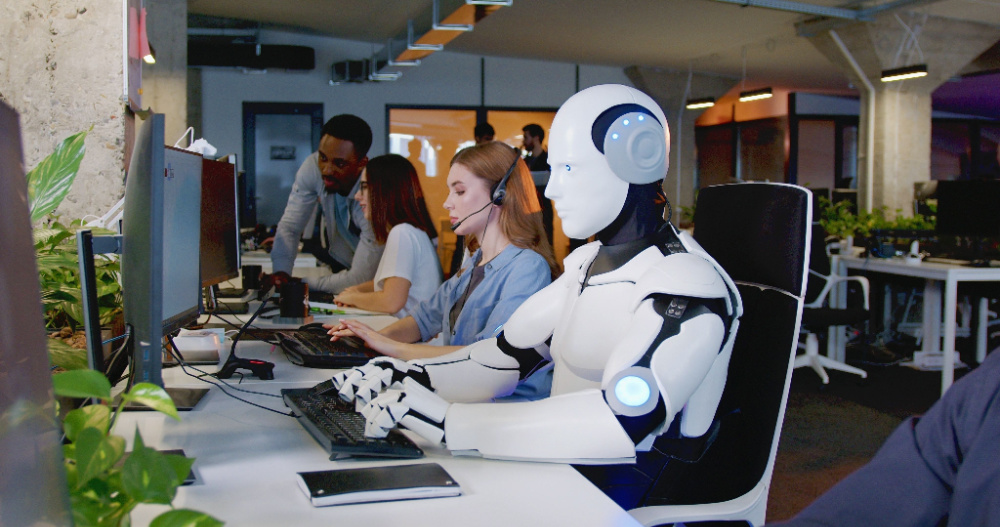AI-Enhanced Leadership: Maximizing Potential with Intelligent Tools
Let’s also take a closer look at Ai vs. human – Who has more charisma in today’s world?
Do you prefer to listen to this article? Click below to access our AI-generated version of this blog article!
AI-Enhanced Leadership: Maximizing Potential with Intelligent Tools
In an exclusive interview with Niels Cimpa, learning coach and AI expert, we explore how AI can be integrated into leadership development and what new skills will become increasingly important in an AI-driven world.
How can artificial intelligence AI be used in leadership development and training?
I believe that artificial intelligence (AI) is playing an increasingly important role in leadership training and development, both in formal educational institutions and in continuing education programs. In my opinion, AI can teach complex models and content better and in more detail than humans because it has access to a huge database.
In a leadership seminar, for example, a human could present the basic content, but individual exercises or questions could be answered more effectively by AI. I also see great potential for AI in self-study, such as online learning. As a leader, for example, I could train with an AI to practice non-violent communication and receive individual feedback and explanations.
Thanks to its extensive database, AI can explain content to me in a wide range of scenarios and variations that go beyond the knowledge of a trainer. I therefore believe that AI can contribute a lot to leadership development, especially in terms of content.
Which skills and competencies do you think will become increasingly important for leaders in a working world shaped by AI?
I think that the role of the leader will change in a working world characterized by AI. As AI can increasingly take on content-related tasks, the focus of leaders in the 21st century is shifting away from pure specialist knowledge towards interpersonal skills.
In the future, it will be more important for leaders to think about how they motivate their team, how they set goals, and how they promote a positive culture of discussion and corporate culture. It’s about taking on a supportive and communicative role that focuses on social skills.
I also see problem-solving skills, particularly in the interpersonal area, as increasingly important. Skills such as coaching, i.e. working with people on specific topics, and guiding them through problem-solving processes are becoming increasingly important.
AI can take on many tasks, but it cannot coach or respond individually to personal problems. I therefore believe that, in addition to social skills, shaping interpersonal relationships is becoming increasingly important for leaders.

This brings me to my next question: what challenges and opportunities does the integration of AI in leadership development present?
I see mostly opportunities in the integration of AI into leadership development, although there are also challenges. One of the biggest challenges I see is the initial skepticism and the need to find out what is feasible with AI in the company.
Leaders first have to embrace the new possibilities and try out many things. Despite initial rejection, companies that are already working with AI have significantly increased their productivity, particularly in the area of training and leadership development.
The opportunities lie primarily in the fact that leaders can focus more on leadership and developing social skills. This can make the corporate culture more human and approachable and potentially flatten hierarchies to a large extent.
Another challenge for leaders is to hand over certain tasks to AI, as they are used to being in control and being informed about everything. This requires a rethink and allowing AI to be more “competent” in certain areas. The advantage of this is that it frees up resources, both for the leader and for the company as a whole.
As a leader, it is therefore very important to think carefully about what role and tasks AI should take on in the company. It is recommended that AI is used to expand knowledge and facilitate work processes. Data protection is a key aspect of this.
I hear a lot that it is a challenge for the leaders of today and tomorrow to concretize the use of AI and to really hand over competencies and tasks so that this can also be achieved.
Yes, I agree that it is a major challenge for leaders to concretize the use of AI in the company and to effectively hand over certain skills and tasks to AI. It’s about managing this change. I would like to add that there is a lot to define, especially the strengths, weaknesses, and dangers of AI.
It is important to set clear rules about what AI can and cannot do, and what tasks it should and should not take on. Defining these guidelines for the use of AI in the company is crucial, especially in the current phase, which can seem somewhat chaotic.
Yes, and I know this myself from our company, it’s simply a matter of trying, trying, trying, as you mentioned earlier. In other words, really engaging in discourse, testing things together, and concluding yourself and your own company.
What do you think about the assumption that AI can largely affect our business in the sense of “Is it even necessary to send leaders on training courses”?
I think that the personal component in terms of learning is indispensable. The experience of seeing a person on a stage, feeling their energy, and being inspired by them is something that AI cannot replace. So I think AI will take over certain areas of training; for some people, it may even be able to do most of the training work.
However, some people prefer interpersonal contact and need the emotion and energy of a physical presence. So I don’t think AI will make the training business completely obsolete, as human interaction will continue to be important. However, there will be areas and target groups that prefer to learn with AI.
Similar to social media or YouTube, where some people prefer to learn via online courses. But I wouldn’t want to learn everything online, even if it were possible. Sometimes I just want to go to an event for the experience, the education, the networking, and that’s something that AI can’t offer me.

That’s why I think it’s really important to see AI as a complementary tool to the existing training opportunities that we use today.
Exactly, it’s about finding a balance and not competing with AI. In terms of knowledge transfer, I probably can’t compete with AI, as it is superior in this area. However, when it comes to charisma, AI can’t compete with me because it simply doesn’t have these human qualities.
Now I’d like to come to an end and talk about your book “Learning Successfully with ChatGPT”. What can leaders learn from your book for dealing with ChatGPT?
My book “Erfolgreich mit ChatGPT lernen” (Learning successfully with ChatGPT), which is mainly aimed at pupils and students, is about effective learning methods with ChatGPT. The book not only conveys specific factual knowledge but also general learning strategies on how to learn quickly and actively. Although the book is primarily aimed at younger learners, the content is useful for anyone.
The ability to quickly familiarize yourself with and understand a topic is extremely valuable. The book shows how to quickly grasp a topic and talk about it, which is especially important in interpersonal interactions. Learning is and remains an important skill, and my book provides guidance on how to acquire knowledge and learn languages efficiently. It also describes how AI can be used as support, for example as a digital assistant or mentor.
Conclusion
In summary, it can be said that the use of AI in leadership development offers the opportunity to convey complex content in a more detailed and individualized way. It is clear that AI not only serves as a tool for more efficient learning but also helps to direct leaders’ focus on social skills and team dynamics.
The challenge lies in integrating AI into existing structures in a meaningful way without neglecting the human component. The integration of AI represents a balance between technological support and the preservation of essential human interactions.
It is about using AI as a complementary tool that enriches the development of leaders without replacing the personal component of learning and leadership. AI thus serves not as a substitute, but as a valuable extension that allows leaders to focus on their core competencies while developing their skills in a technologically advanced environment.

Alina Helmlinger
L&D Consultant, MA
Alina has been an L&D Consultant at MDI since 2021 and supports clients from various industries in the tailor-made design of various leadership development programs and training courses. In addition to her practical knowledge and the experience she has already gained in further training, she draws on her sound theoretical knowledge from her Bachelor’s degree in Human Resources Management and her Master’s degree in Organizational and Personnel Development, which she completed in June 2022. Alina keeps calm, especially in challenging situations and leaders to reconcile the interests of different stakeholders in complex projects, thereby designing tailor-made HR solutions geared towards customers’ needs.


